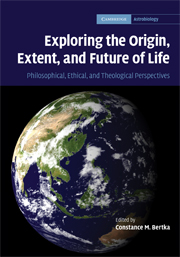 Exploring the Origin, Extent, and Future of Life
Exploring the Origin, Extent, and Future of Life Book contents
- Frontmatter
- Contents
- List of contributors
- Acknowledgements
- 1 Astrobiology in a societal context
- Part I Origin of life
- 2 Emergence and the experimental pursuit of the origin of life
- 3 From Aristotle to Darwin, to Freeman Dyson: changing definitions of life viewed in a historical context
- 4 Philosophical aspects of the origin-of-life problem: the emergence of life and the nature of science
- 5 The origin of terrestrial life: a Christian perspective
- 6 The alpha and the omega: reflections on the origin and future of life from the perspective of Christian theology and ethics
- Part II Extent of life
- Part III Future of life
- Index
- References
3 - From Aristotle to Darwin, to Freeman Dyson: changing definitions of life viewed in a historical context
from Part I - Origin of life
Published online by Cambridge University Press: 29 December 2010
- Frontmatter
- Contents
- List of contributors
- Acknowledgements
- 1 Astrobiology in a societal context
- Part I Origin of life
- 2 Emergence and the experimental pursuit of the origin of life
- 3 From Aristotle to Darwin, to Freeman Dyson: changing definitions of life viewed in a historical context
- 4 Philosophical aspects of the origin-of-life problem: the emergence of life and the nature of science
- 5 The origin of terrestrial life: a Christian perspective
- 6 The alpha and the omega: reflections on the origin and future of life from the perspective of Christian theology and ethics
- Part II Extent of life
- Part III Future of life
- Index
- References
Summary
Introduction
The origin of life has always been a topic charged with religious import. This chapter aims to survey briefly some origin-of-life ideas over time; first, if we look in detail at how the debate over life's origin played out between Darwin and his supporters, we will see a clear example of this. Note that I said Darwin's supporters, rather than his opponents. We expect a story about the new evolutionary science to include much heated objection from religious groups, for whom so many aspects of Darwin's theory produced problems. But a look at how divisive the issue was among the Darwinians themselves is an even more complex and enlightening story, perhaps of more relevance to scientists in their own work.
By the 1850s, William Benjamin Carpenter, Professor of physiology at the Royal Institution of London, believed, as did Herbert Spencer, that the vital force of living things was completely interconvertible with forces from non-living nature such as heat, electricity, kinetic energy, etc. However, also like Spencer and a number of others in the Darwinian camp, Carpenter believed that the conversion of heat or chemical energy into vital energy could only be accomplished through the agency of already living matter; in other words, that non-living matter could never organize itself into living matter capable of generating vital force. This served as a convenient theoretical barrier separating modern physiology and its ally, the new evolution theory, from the bête noir of spontaneous generation.
- Type
- Chapter
- Information
- Exploring the Origin, Extent, and Future of LifePhilosophical, Ethical and Theological Perspectives, pp. 47 - 60Publisher: Cambridge University PressPrint publication year: 2009
References
- 2
- Cited by
